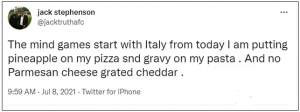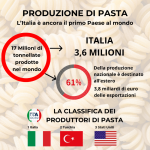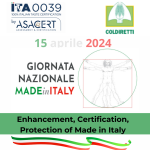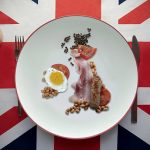A few days before the soccer match that would see Italy and England compete to win the title of European Champions, English fans made a promise: not to eat Italian food until the end of the match.
“The mind game start today. I’m putting pineapple on my pizza and gravy on my pasta. And no Parmesan cheese grated cheddar”, it reads on Twitter.
Giving up Parmesan, saying goodbye to Prosecco, putting aside ricotta. Anything to show their support for Gareth Southgate and his team. For most, the renunciation was meant to be a playful game, a challenge against themselves (who could ever give up on pizza?), but for some, it was no laughing matter: “None of you dare to buy pizza for the takeaway on Sunday night,” wrote one fan.

We all know how it ended: Mancini’s Azzurri triumphed on penalties and the coveted cup won’t be coming home.
In the meantime, the scene of Leonardo Bonucci, defender of the national team, who, addressing the English fans, exulted with: “You still have to eat pasta”, has gone viral. As if to say that these victories are also the result of an all-Italian diet. And indeed, if the English performance should really be based on the consumption of pasta, then the defeat would be more than justified, since, according to data processed by Coldiretti, 2021 marked a 25% drop.
The championship is over, but the resentment of the English is not: still disappointed by this defeat, they preferred to pay homage to their country by continuing to eat fish and chips, rather than return to occupy the tables of Italian restaurants. The latter, in fact, following the Italian victory, have seen bookings decrease by 55% (source: theFork UK), while calls to cancel have increased. All this leaves many owners surprised and confused, already worried about the effects that an eventual victory/defeat would have had on their restaurant, so much so as to lead them – just a few hours before the final – to lower their shutters first.
In short, this is a difficult year for Made in Italy across the Channel, which must already deal with the disastrous effects of Brexit. The main worry is the collapse of exports equal to 38.3%, whose value is around 3.4 billion euros per year.
And if we can’t complain football-wise, from the agri-food point of view the result is unpleasant for both “teams”.
England loves our cuisine, so much that it is one of the main buyers, especially when it comes to tomato sauce, pasta, cheese, wine and prosecco. All products that Italy is very happy to sell abroad, but that are causing struggles because of the after-Brexit bureaucracy that certainly prevents companies and producers, especially the smallest, to operate in the UK. If it is true that the paperwork to be filled out is the same for everyone, it is also true that large companies can handle this burden, which instead penalizes small agribusinesses. Two customs, one at the entrance and one at the exit, a series of documents for each one, customs codes for every single product, increasing taxes: all of this significantly slows down the export process. Moreover, the failure to comply with the Brexit agreements facilitates the entry of products that do not meet European safety standards and that are counterfeits and imitations of protected products, such as Chianti and Parmigiano. No control means no protection for Italy, which should face the unfair competition generated by the proliferation of fake Made in Italy and, consequently, of Italian Sounding.
Discovering true Italian cuisine abroad can, at times, be difficult. For this reason, ASACERT has focused on a number of selective criteria that contribute to composing a final rating of Italianness, through the Protocol ITA0039 | 100% Italian Taste. Among the elements of the checklist analyzed by the auditors, in fact, particular attention is paid to the production chain of raw materials used for the preparation of dishes.
ASACERT and the ITA0039 Network have been working for some time to ensure that the rules on the field are respected and that the game is as honest and transparent as possible. And if in soccer this task is assigned to referees or VAR, in the food sector the protection of Made in Italy is up to the ITA0039 APP: a network that connects customers, producers and restaurateurs. All ready to referee a game that sees the unparalleled Made in Italy clashing against the champions of Italian Sounding.
We cheer Made in Italy!







